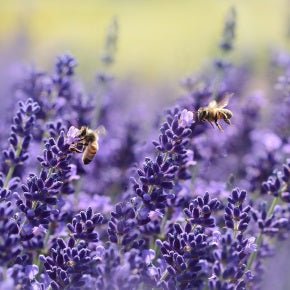Could bees be the key to unlocking the link between gut health and mental health? This week’s Nutrition News covers the very latest in nutritional research including research from Jiangnan University that uses bees to solve age old question.
Find out more here.
Scientists discover link between gut health and memory in bees
Bees’ cognitive abilities vary and, compared to other mammals, they have a relatively small community of gut microorganisms; this makes them perfect to study when investigating the link between gut health and memory.
Researchers from Jiangnan University, China in collaboration with researchers from Queen Mary University of London and the University of Oulu, Finland, as reported in this article, found that a specific gut bacteria, Lactobacillus apis, correlates with enhanced memory in bees.
The study involved different coloured artificial flowers, five of which contained a sweet sucrose solution and another five colours had a bitter tasting solution, containing quinine, which is a repellent for bees. The bees were then monitored to see how quickly they learned the colours associated with the sweet tasting solution and then whether they remembered in a follow up test three days later.
The researchers were able to compare differences between the bees through sequencing gut samples; then, to confirm the effects of Lactobacillus apis, the researchers supplemented the bees’ diet with this strain of probiotic and tested again.
Speaking of the research, lead researcher Dr Li Li, said that the findings “show a causal link—that by adding the same bacterial species to a bee’s diet can enhance their memories. Further research will be required to determine if and which bacteria species might have the same effect in humans. But our work has shone a bright light on this possibility.”
Study links ashwagandha and stress relief
In addition to probiotics supporting memory, a separate study has investigated the effects of ashwagandha on memory and stress support. Ashwagandha extract comes from the root of ashwagandha, which is a small shrub native to India and North Africa.
The study, which was reported by NutraIngredients, found a significant benefit to cognitive health, sleep and stress management after test subjects supplemented with the extract for 90 days. The double-blind, placebo-controlled, randomised clinical trial adds to existing research that suggests ashwagandha could play a role in supporting the body’s response to stress, sleep and cognitive function.
The study involved 130 healthy but stressed participants between the ages of 20 and 55. Each participant was given either 300 mg of ashwagandha to take per day or a placebo. The Cambridge Neurophysiological Test Automated Battery (CANTAB) was used to measure cognitive performance, which was shown to increase in the ashwagandha group, whist lower scores were seen for this group on the Perceived Stress Scale (PSS) and lower serum cortisol levels. These results suggest that ashwagandha’s role in nutritional support could be far ranging, supporting cognition, stress and sleep management.
Correlation between overweight children and poor heart health
We recently reported that childhood obesity is on the rise, but new research suggests that this could have a devasting impact long term on children’s health.
The research from the University of Georgia, reported by Science Daily, found significantly higher levels of visceral fat and arterial stiffness in overweight young people than in those who were a healthy weight. This could have huge implications for heart health with visceral fat affecting the vital organs and arterial stiffness putting pressure on the cardiovascular system, making it harder to pump blood around the body. This can result in heart disease and attacks in childhood and adolescence, leading to ongoing problems.
It is important to stay within the healthy BMI range through weight management at any age but it is more important still in children as the effects of being overweight can have serious, ongoing consequences.
Share your thoughts
Agree with the findings in this week’s Nutrition News? Share your thoughts with us on Facebook and Twitter.
 Alison is the Founder of Metabolics who writes about Metabolics updates, events and natural healthcare. Her experience and passion for natural supplements and healthcare comes from her years of experience as a practising osteopath, having founded Metabolics in her search for high quality, natural products in her own work. Alison has been a qualified and practising Osteopath since 1981 and regularly gives seminars on a range of healthcare subjects to the wider practitioner community helping share her knowledge and experience.
Alison is the Founder of Metabolics who writes about Metabolics updates, events and natural healthcare. Her experience and passion for natural supplements and healthcare comes from her years of experience as a practising osteopath, having founded Metabolics in her search for high quality, natural products in her own work. Alison has been a qualified and practising Osteopath since 1981 and regularly gives seminars on a range of healthcare subjects to the wider practitioner community helping share her knowledge and experience.




